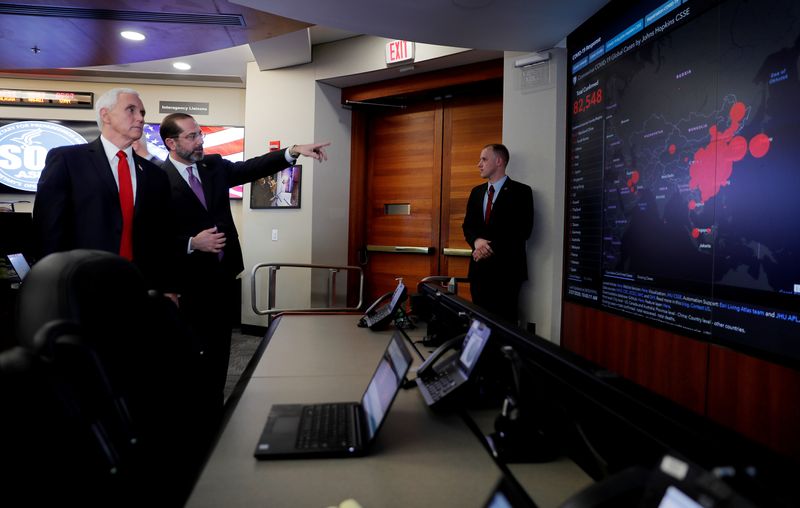This post was originally published on this site
https://i-invdn-com.akamaized.net/trkd-images/LYNXNPEG1Q1YK_L.jpg
By Ted Hesson and Alexandra Alper
WASHINGTON (Reuters) – President Donald Trump’s administration is considering invoking special powers to rapidly expand domestic production of protective masks and clothing to help combat the coronavirus in the United States, two U.S. officials told Reuters.
The move would be part of ramped-up efforts by U.S. officials to guard against the virus’s spread in the United States, where the number of confirmed cases is still relatively small at 60, most of them repatriated American passengers from the Diamond Princess cruise ship docked in Japan.
Wall Street’s main indexes tumbled for the sixth straight session on Thursday as investor uncertainty about the economic impact of the crisis put the S&P 500 on track for its fastest correction in history.
During an interagency call on Wednesday, officials from Health and Human Services (HHS) and the Department of Homeland Security (DHS) discussed the possibility of invoking the Defense Production Act for the manufacture of “personal protective equipment” that can be worn by healthcare workers to prevent infection, according to a DHS official.
A White House official confirmed that the administration was exploring the use of the law to spur manufacturing of protective gear. Both officials requested anonymity to discuss the issue.
On Thursday, HHS Secretary Alex Azar told a House of Representatives committee that at least 40 public health labs should now be able to test specimens for coronavirus and that could more than double as soon as Friday.
He said a newly manufactured test from the Centers for Disease Control and Prevention (CDC) can be sent to 93 public health labs as soon as Monday, and a privately manufactured test based on the new CDC test could be sent to those same labs as early as Friday.
Quick confirmation of coronavirus cases is crucial to rapid response by local health authorities, and states previously reported that some test kits provided by CDC were producing inconclusive results.
Some state and local public health workers have expressed doubts about how quickly the country will be able to scale up its testing capability, however.
Scott Becker, the CEO of the Association of Public Health Laboratories (APHL), said his group had worked with the CDC and the Food and Drug Administration to develop a way to quickly increase testing capacity but these tests will still have to be validated by states, which could take several days.
“If quality control goes well as expected by the end of next week, upwards of 40 labs will have testing capabilities in addition to the 12 we have,” Becker told Reuters.
California Governor Gavin Newsom told a news briefing his state has only about 200 test kits, an “inadequate” number, but has been in “constant contact with federal agencies” who have promised to send a fresh supply in coming days.
POLITICS
Funding for the preparations has become a political issue in an election year. Trump, a Republican, is seeking $2.5 billion from Congress to boost the government’s response. Senate Democratic Leader Chuck Schumer has called for $8.5 billion.
Senate Majority Leader Mitch McConnell said he expected the divided U.S. Congress would make an urgent bipartisan effort to come up with legislation to fund the fight.
“I hope they can work expeditiously so the full Senate would be able to take up the legislation within the next two weeks,” said McConnell, speaking on the Senate floor.
China, where the coronavirus started, has borne the brunt of the outbreak, with nearly 80,000 cases and 2,746 deaths. It has spread to another 44 countries with 3,246 cases and 51 deaths reported.
Trump told Americans in a news conference on Wednesday that the risk from coronavirus remained “very low.”
But with new infections reported around the world now surpassing those in mainland China, World Health Organization Director General Tedros Adhanom Ghebreyesus said even rich nations should prepare for surprises.
“No country should assume it won’t get cases, that would be a fatal mistake, quite literally,” Tedros said, as governments from Iran to Australia raced to contain the epidemic’s global spread.
Various treatments are being tested for the virus, that can lead to pneumonia, but a vaccine may take up to 18 months to develop, health officials have said.
While U.S. stock indexes pared some losses, the S&P 500 () fell as much as 11.2% from its record close on Feb. 19 and the Nasdaq () dropped 12.2% from its own peak. At its session low, the Dow Jones Industrials () declined 12.1% from its Feb. 12 closing high.
If the S&P closes 10% below its record close this would be its fastest correction ever, taking just six trading days.
Trump, who is running for re-election in November, has been increasingly alarmed by the market reaction. On Wednesday he blamed Democrats competing to be their party’s nominee to run against him as well as two cable TV news channels, CNN and MSNBC, for spooking investors.
On Thursday, Democrats went on the offensive.
“I’m worried this administration is not prepared for the global outbreak,” U.S. Representative Bill Pascrell told Azar, citing Trump’s tweets focused on the stock market. “I don’t see a plan to manage the risk.”

